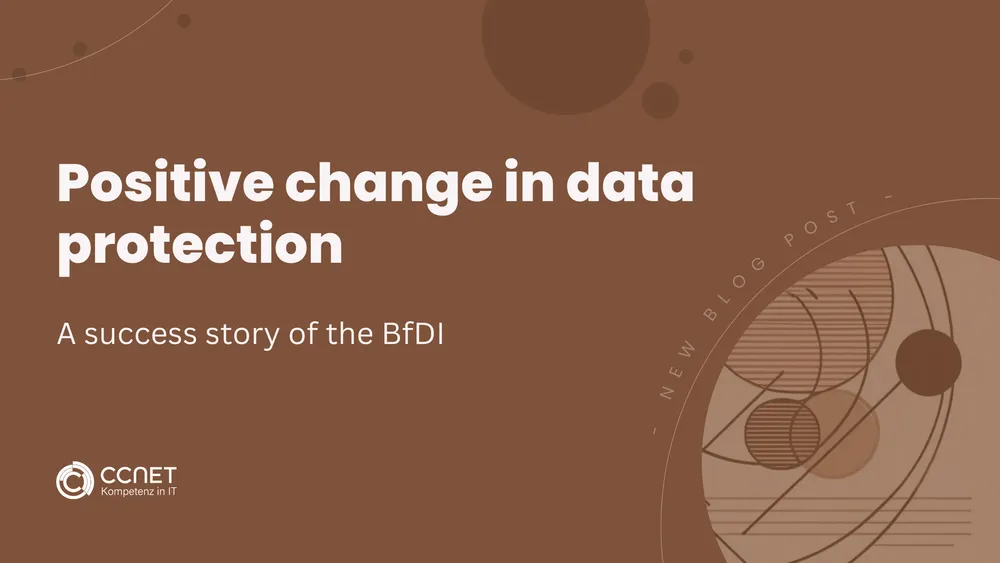
CCNet
Oct 18, 2024 • 3 min read

Data Protection and Advice - The key to data security
In an era where data protection is at the forefront, inspections and advisory visits by the Federal Commissioner for Data Protection and Freedom of Information (BfDI) have shown that data protection is not only a challenge but also an opportunity. Through direct insights into the practice of data processing at a variety of companies and public institutions, not only existing data protection deficiencies have been uncovered, but also significant improvements and sensitizations for data protection have been achieved. These visits provide key advice to organizations, helping them strengthen their data protection strategies and ensure long-term compliance.
A core aspect of these visits is the integration of inspection and consultation. This approach enables the supervised entities to continuously improve their handling of personal data. The focus is not on sanctioning, but on advising and supporting the promotion of data protection-friendly processes. This approach demonstrates that data protection and efficient administrative processes can go hand in hand and emphasizes the awareness of data protection as a continuous process of enhancement.
The positive reception of advisory and inspection activities by the visited entities demonstrates the value of these approaches. It became clear that open dialogue and willingness to cooperate are crucial to improve understanding and implementation of data protection practices. Particularly noteworthy is the approach of spreading data protection "widely" and involving smaller companies as well as different regions in advisory activities. This contributes to creating a broad understanding and acceptance of data protection measures.
Thus, the conducted inspection and advisory visits serve as an important anchor point for companies' own internal reviews. They prompt self-reflection: Where does the company stand regarding data protection? What can be improved? Often, the announcement of an inspection already leads companies to intensively engage with the topic of data protection.
The experiences and insights gained from inspections and consultations show that data protection inspections and consultations can be seen not only as audit mechanisms but also as opportunities for enhancement and sensitization. This approach provides real added value for practice and sustainably strengthens awareness of data protection.
The recognition and implementation of data protection practices as an opportunity for improvement underscore the importance of proactive data protection management. By considering data protection not as an obstacle but as an integral part of their business processes, organizations can not only meet legal requirements but also strengthen the trust of their customers and users.
This positive development in the field of data protection encourages continued and strengthened cooperation between data protection authorities and the supervised entities. It demonstrates that through commitment, cooperation, and the willingness to continuously improve, data protection can be effectively implemented in practice and established as a valuable part of corporate culture.
FAQs on the BfDI and data protection
What are digital identities and why are they important?
Digital identities enable secure access to online services and are essential for participation in digital life, for example in administrative services or civic engagement.
When is the use of digital identities justified?
Only when unique identification is actually necessary—otherwise, alternative, more privacy-friendly methods should be used.
How can digital identities be designed to be privacy-friendly?
Through technologies such as selective disclosure, where only necessary data is transmitted – for example, in digital wallets such as the EUDI wallet.
What is the principle of selective disclosure?
It allows users to disclose only the information that is absolutely necessary for online transactions, not the entire contents of their ID.
What are the risks associated with digital identities?
Dangers such as tracking or movement profiles can violate the right to informational self-determination – pseudonymous use is therefore essential.
Why is supporting pseudonymous use important?
It protects users' privacy by allowing them to participate in digital services without fully disclosing their identity.
What needs to be considered when developing secure digital identities?
They must be user-friendly, secure, and compliant with data protection regulations—this requires cooperation between the government, tech companies, and data protection experts.
What challenge does the balance between convenience and data protection pose?
Systems must not focus solely on convenience—data protection and security must be equally important goals in the design of digital identities.
What does the future of digital identities look like?
Their development depends heavily on how consistently data protection aspects are taken into account—they should enable digital participation without jeopardizing fundamental rights.


